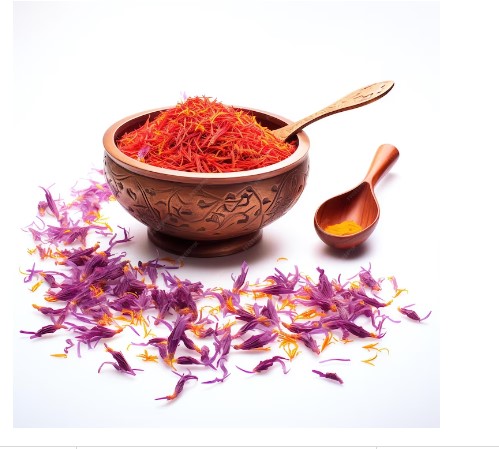In the realm of culinary delights and medicinal wonders, saffron reigns supreme. For centuries, people have coveted saffron as a spice worth its weight in gold, with its vibrant hue and exquisite aroma. Apart from its culinary excellence, saffron’s multitude of health benefits has intrigued both researchers and wellness enthusiasts.
The History of Saffron
Dating back to ancient times, saffron has been prized by civilizations across the globe. Its origins can be traced to the Mediterranean region, where it was revered by the ancient Greeks and Romans for its culinary and medicinal properties. Tales of opulence, trade routes, and its status as a symbol of luxury and prestige mark saffron’s journey through history.
Culinary Delights
Saffron’s distinctive flavor and aroma make it a prized ingredient in culinary traditions around the world. Saffron enhances savory dishes like paella and risotto, as well as sweet treats like saffron-infused ice cream and cakes. Its ability to elevate the simplest of dishes to gourmet status has earned it a permanent place in the kitchens of chefs and home cooks alike.
A Glimpse into Saffron Production
The journey of saffron from field to table is a labor-intensive process that requires meticulous care and attention to detail. Saffron is harvested from the delicate stigma of the Crocus sativus flower, commonly known as the saffron crocus. Workers carefully hand-pick and dry the three stigma threads produced by each flower to preserve their flavor and aroma. Saffron is often referred to as the “red gold” due to its rarity and the labor-intensive nature of its cultivation.
Health Benefits of Saffron
Beyond its culinary allure, centuries of traditional use and modern scientific research have documented a plethora of health benefits in saffron. Rich in antioxidants such as crocin, crocetin, and safranal, saffron exhibits anti-inflammatory, anti-cancer, and neuroprotective properties. Research indicates saffron may enhance mood, alleviate depression and anxiety, boost cognitive function, and support heart health.
Saffron in Traditional Medicine
Ayurveda, Traditional Chinese Medicine, and Unani medicine value saffron’s medicinal properties alongside its culinary uses. Traditional practitioners have used it to treat a wide range of ailments, including digestive disorders, respiratory problems, menstrual irregularities, and skin conditions. Saffron’s versatility as both a spice and a medicine underscores its importance in holistic approaches to health and wellness.
Incorporating Saffron into Your Diet
Adding saffron to your diet is a simple and delicious way to reap its health benefits. You can enjoy saffron by infusing it into tea, sprinkling it on yogurt, or using it in various recipes. However, it’s essential to use saffron sparingly, as its intense flavor and color can overpower dishes if used in excess.
Exploring Saffron’s Potential
Researchers studying the health benefits of saffron are discovering fascinating new uses for this golden spice. Saffron has promise as a natural treatment for a variety of conditions, including diabetes, cancer, and weight control. It can also help with weight management and enhance skin health.
Saffron in Modern Medicine
The scientific community has been paying more attention to saffron recently because of its potential medicinal benefits. Clinical trials have shown that saffron is effective in treating illnesses such as depression, Alzheimer’s disease, and premenstrual syndrome (PMS). A more comprehensive approach to health and wellbeing is being provided to patients by the growing use of saffron supplements and extracts as adjuvant therapies to traditional treatments.
Sustainability and Ethical Considerations
Saffron production confronts issues with sustainability and ethical sourcing despite its demand and popularity. Supporting environmentally friendly and fairly labor-intensive sustainable saffron agricultural methods is becoming more and more important as consumer awareness rises. By choosing ethically sourced saffron products, customers can enjoy the benefits of this priceless spice while also making a positive social and environmental impact.
Tips for Buying and Storing Saffron
It is crucial to look for premium products produced by reliable vendors when buying saffron. Saffron threads are preferable to powdered saffron since the former keeps its flavor and scent longer. To maintain its freshness and strength, keep saffron out of direct sunlight and store it in an airtight container in a cold, dark environment.
Conclusion: Embracing the Golden Spice
To sum up, saffron’s value as a spice goes much beyond its culinary appeal and includes a plethora of health advantages. Safflower has a long history of captivating people and nourishing bodies and spirits. Its labor-intensive production technique, diverse culinary applications, and medicinal qualities are just a few of its many attributes. You can personally witness the enchantment of this golden spice by including saffron in your diet and accepting its restorative properties.













